On 29 August 2025, TAPA APAC marked one of the major milestones in advancing supply chain resilience with the official launch of the Pharmaceutical Facility Security Requirements (PFSR). The launch webinar brought together security leaders, auditors, and professionals from across the Asia-Pacific region, including both TAPA APAC members and non-members, to learn about the new standard, its relevance to industry challenges, and the benefits it delivers.
The webinar featured insights from an esteemed panel of experts:
- Dr. Shamsir Bin Ali, Managing Director, Omnispheres
- Aaron Coppard, Global Director, Risk Intelligence and Supply Chain Security, GSK
- Dr. Amarpreet Singh, TAPA APAC Board of Directors & Standards Committee Lead; Country Security Manager, Johnson Matthey
- Doreen Tan, Government & Trade Services Manager, Intertek
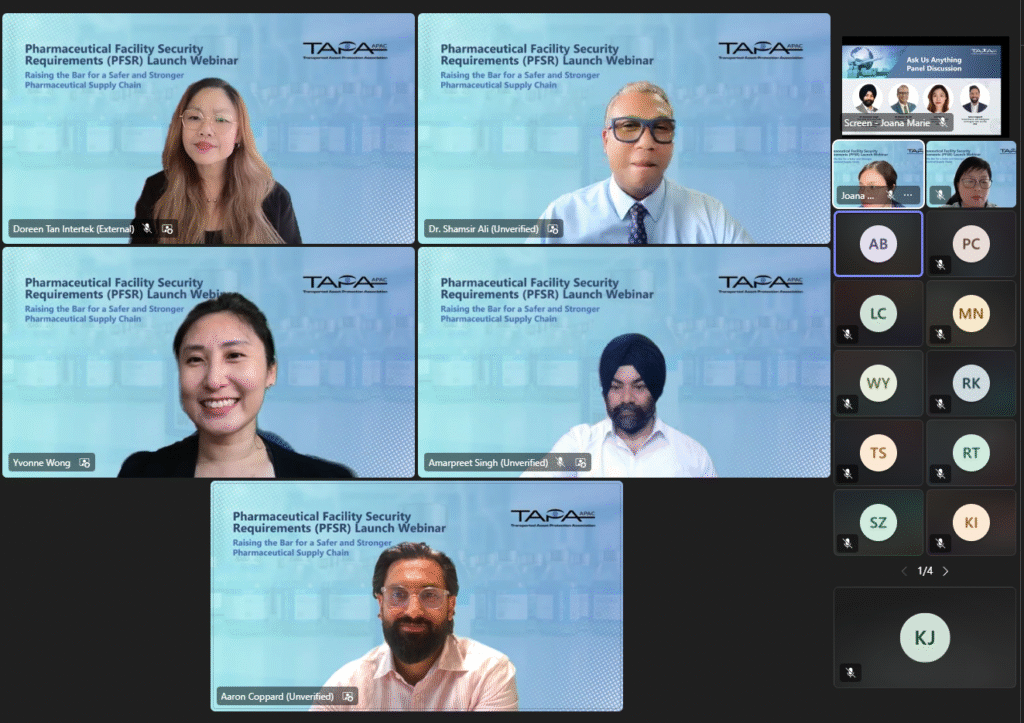
This event came at a timely moment. Pharmaceutical supply chains are not only complex but also uniquely high stakes. As Dr. Amarpreet Singh, TAPA APAC Board of Directors & Standards Committee Lead, put it:
“The health and safety of patients directly depends on the integrity of our operations. Weaknesses in the chain don’t just disrupt business, they risk lives, erode trust, and increase costs across the healthcare ecosystem.”
The PFSR provides a practical, globally recognized framework to help the industry address these risks with greater confidence and resilience.
Understanding the Risks: A Growing Threat Landscape in Pharmaceutical Industry
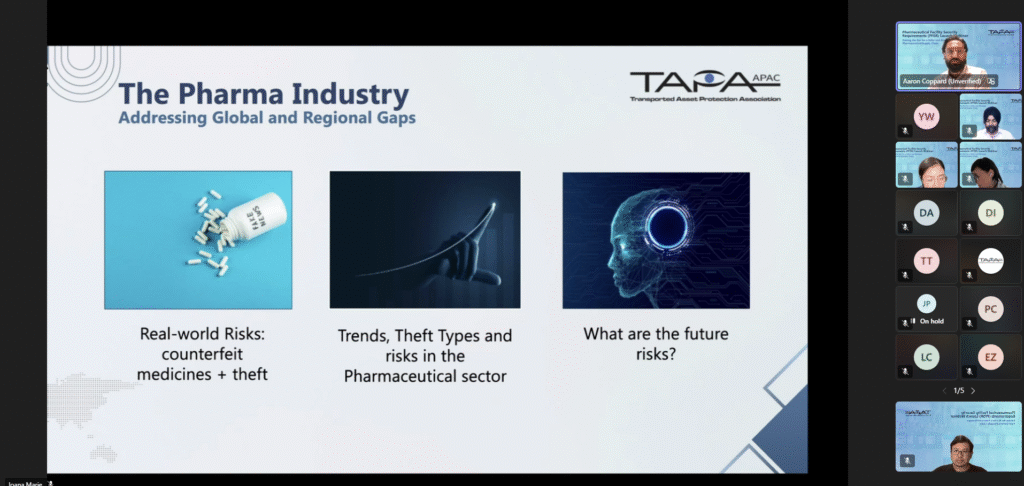
The first session set the stage by exploring the evolving threat landscape. Aaron Coppard, Global Director of Risk Intelligence and Supply Chain Security at GSK, shared insights into the risks facing pharmaceutical cargo across the Asia Pacific.
He described how organized criminal groups are deploying sophisticated tactics, from repackaging genuine medicines with counterfeits to blending fake drugs with authentic products.
“Counterfeit medicines remain one of the biggest risks,” Aaron explained. “They threaten lives and damage brand reputation. We continue to see persistent cargo thefts and pilferage in transit, particularly in markets such as India, Indonesia, China, and Bangladesh.”
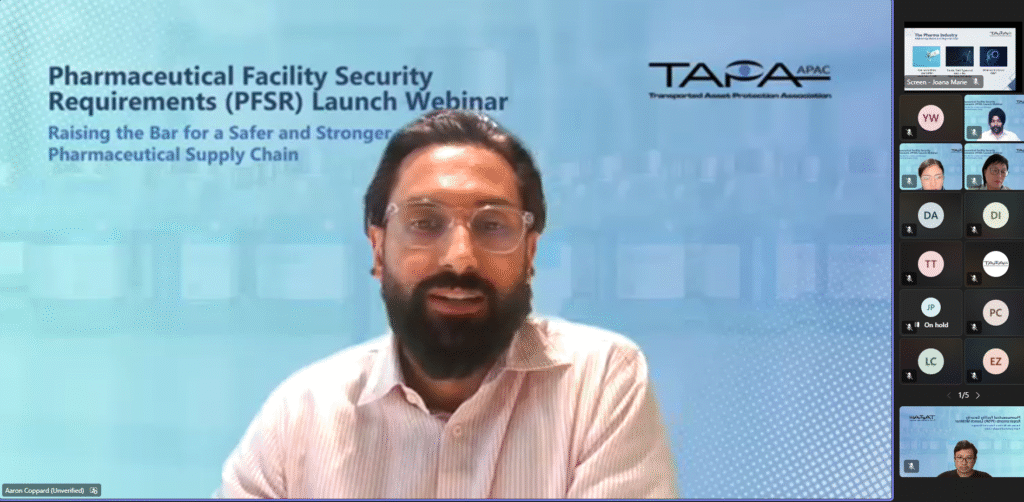
Aaron also pointed to emerging risks, cyber threats as supply chains become digitized, the criminal use of AI to create deepfake identities, and climate disruptions affecting storage and transport of temperature-sensitive medicines.
By these, he also underscored the value of TAPA’s Intelligence System (TIS) urging participants to contribute data that strengthens the collective fight against crime. “Every piece of information matters,” he stressed. “Your input helps us see the bigger picture.”
From Framework to Reality: Implementing the PFSR
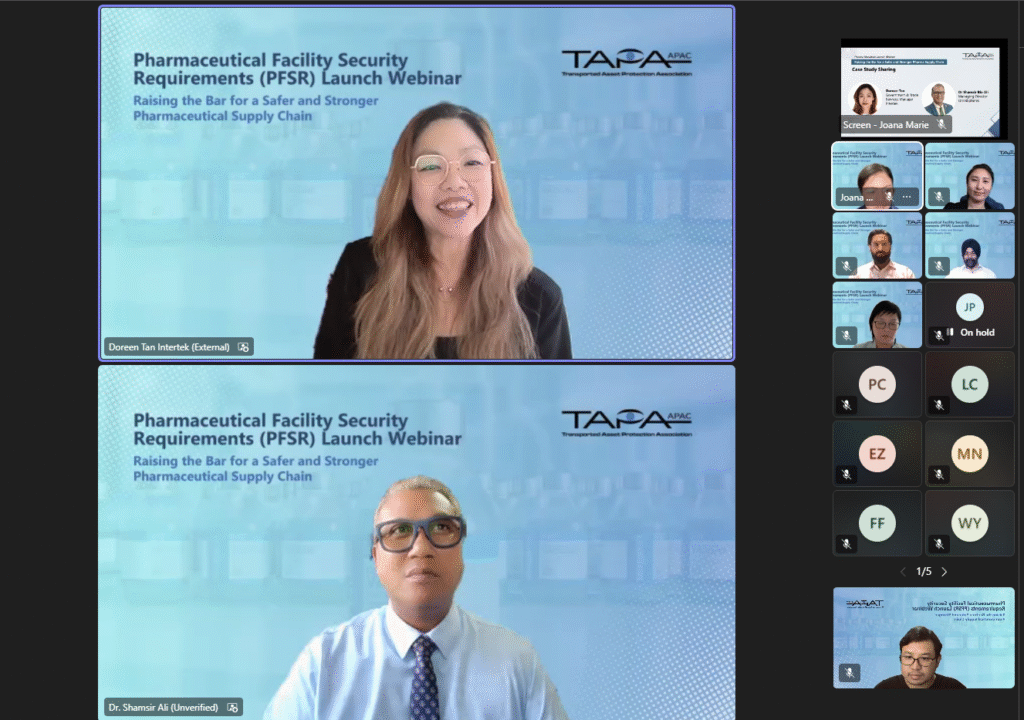
While risks are clear, the second session demonstrated how the PFSR is already making a difference. Dr. Shamsir Bin Ali, Managing Director of Omnispheres, shared his organization’s experience piloting the standard.
Pursuing Level A certification, the highest tier, was no small task, but it was a deliberate choice.
“We wanted to demonstrate leadership and resilience,” Dr. Shamsir said. “It was important to go beyond simply having a system in place. Independent validation ensures that our security practices are effective and sustainable.”
Supporting this view, Doreen Tan, Government & Trade Services Manager at Intertek, offered an auditor’s perspective. As an Independent Audit Body (IAB), Intertek examined critical elements such as access control, secure storage, incident management, and employee training.
“Achieving Level A certification is not a walk in the park,” she noted. “Organizations must provide clear evidence of consistent and sustainable practices. But in doing so, they gain more than compliance, they build stronger security, resilience, and customer trust.”
Through this dialogue, participants saw that the PFSR is not just a standard on paper. It is a living framework that organizations can adopt to enhance their security posture, protect sensitive products, and align with global best practices.
Bridging Gaps, Building Resilience
The launch also emphasized the collaborative foundation of the PFSR. Developed with input from manufacturers, logistics providers, insurers, regulators, and security experts, the framework reflects the real pain points of the pharmaceutical sector.
Dr. Amarpreet highlighted one example: the need for strict environmental controls. “One of the unique aspects of the pharma supply chain is temperature sensitivity,” he explained. “The PFSR acknowledges this with requirements for temperature-controlled trucks, ensuring both security and product integrity.”
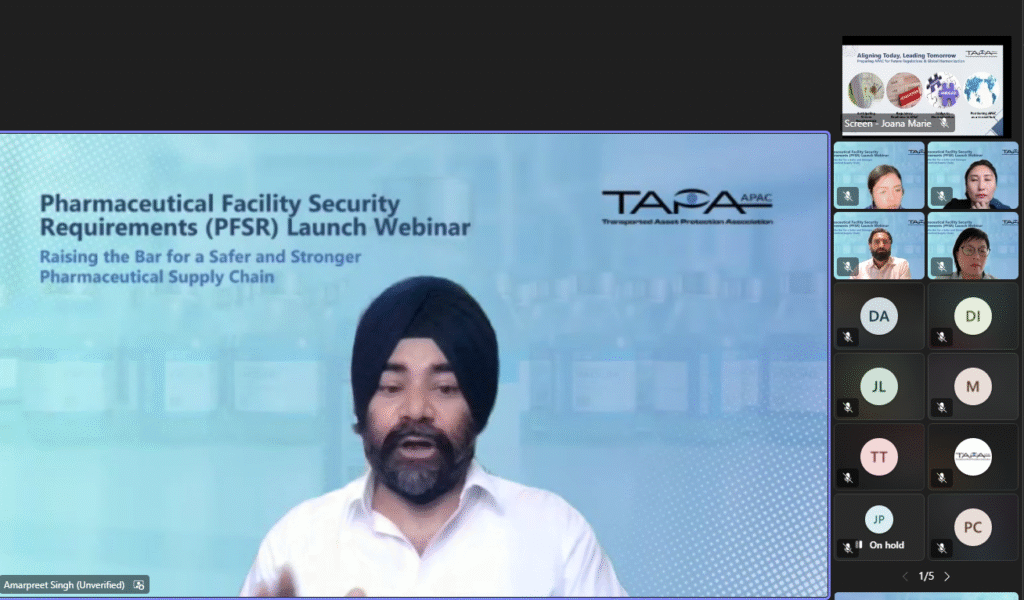
This balance, practicality combined with rigor, is what makes the PFSR adaptable and impactful. It offers international recognition, strengthens facility security, fosters resilience, and builds customer trust, all while remaining implementable in diverse markets.
Looking Forward: 25 Years of TAPA APAC’s Leadership to Resilient Supply Chain
The PFSR launch also coincides with a milestone year for TAPA, as the association celebrates its 25th anniversary of leadership in supply chain security. Across Asia Pacific, TAPA’s footprint already includes more than 2,200 TSR-certified trucks keeping cargo safe on the roads, and over 850 FSR-certified sites securing critical facilities.
The introduction of the PFSR now extends this commitment to the pharmaceutical sector, one of the most vulnerable and critical industries.
As the webinar concluded, the message was clear: resilience is a shared responsibility. The risks are real, but through collaboration, standards, and commitment to best practices, TAPA APAC and its members are building safer, stronger, and more resilient pharmaceutical supply chains.
“For the industry, the PFSR is practical, relevant, and implementable,” said Dr. Amarpreet. “It is strong enough to address critical risks, yet flexible enough for broad adoption. Most importantly, it safeguards what truly matters, patients’ lives.”
To know more about TAPA Standards and PFSR, email info@tapa-apac.org.
